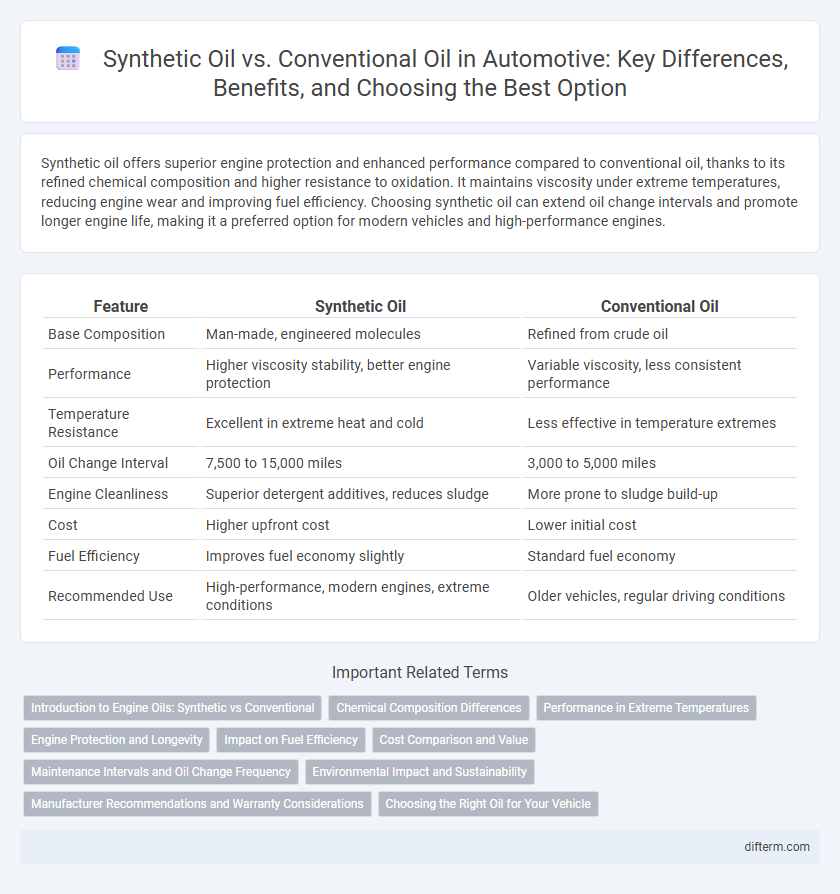Synthetic oil offers superior engine protection and enhanced performance compared to conventional oil, thanks to its refined chemical composition and higher resistance to oxidation. It maintains viscosity under extreme temperatures, reducing engine wear and improving fuel efficiency. Choosing synthetic oil can extend oil change intervals and promote longer engine life, making it a preferred option for modern vehicles and high-performance engines.
Table of Comparison
| Feature | Synthetic Oil | Conventional Oil |
|---|---|---|
| Base Composition | Man-made, engineered molecules | Refined from crude oil |
| Performance | Higher viscosity stability, better engine protection | Variable viscosity, less consistent performance |
| Temperature Resistance | Excellent in extreme heat and cold | Less effective in temperature extremes |
| Oil Change Interval | 7,500 to 15,000 miles | 3,000 to 5,000 miles |
| Engine Cleanliness | Superior detergent additives, reduces sludge | More prone to sludge build-up |
| Cost | Higher upfront cost | Lower initial cost |
| Fuel Efficiency | Improves fuel economy slightly | Standard fuel economy |
| Recommended Use | High-performance, modern engines, extreme conditions | Older vehicles, regular driving conditions |
Introduction to Engine Oils: Synthetic vs Conventional
Synthetic oils feature engineered molecules designed for enhanced lubrication, higher temperature tolerance, and superior engine protection compared to conventional oils derived from crude petroleum. They provide improved oxidative stability, reduced engine wear, and better performance in extreme conditions. Conventional oils offer adequate lubrication for typical driving but may require more frequent changes and exhibit less resistance to breakdown under stress.
Chemical Composition Differences
Synthetic oil features a uniform molecular structure created through chemical engineering, resulting in enhanced stability and performance under extreme temperatures and pressures, while conventional oil contains a diverse mix of hydrocarbon molecules with impurities affecting its consistency and efficiency. Advanced synthetic formulations include additives such as detergents, anti-wear agents, and friction modifiers designed to optimize engine protection and cleanliness. In contrast, conventional oils rely more heavily on natural refining processes, which yields variable chemical compositions and less predictable protective qualities.
Performance in Extreme Temperatures
Synthetic oil maintains stable viscosity and superior lubrication properties in extreme temperatures, preventing engine wear during both intense heat and severe cold. Unlike conventional oil, synthetic formulations resist oxidation and thermal breakdown, ensuring consistent engine performance and protection. This enhanced stability extends engine life and improves fuel efficiency under harsh environmental conditions.
Engine Protection and Longevity
Synthetic oil offers superior engine protection due to its enhanced molecular structure, which reduces friction and resists breakdown at high temperatures, extending engine lifespan. Conventional oil, while effective, lacks the advanced additives and stability found in synthetic variants, leading to increased wear and more frequent oil changes. Engine longevity improves significantly with synthetic oil by maintaining optimal viscosity and preventing sludge buildup, ensuring consistent performance over time.
Impact on Fuel Efficiency
Synthetic oil provides superior lubrication and reduces engine friction more effectively than conventional oil, which leads to improved fuel efficiency by enhancing engine performance. Studies have shown that vehicles using synthetic oil can achieve up to a 3-5% increase in miles per gallon compared to those using conventional oil. This increased efficiency results from the oil's ability to maintain viscosity and protect engine components under extreme temperatures and stress.
Cost Comparison and Value
Synthetic oil delivers superior engine protection and longer oil change intervals, resulting in fewer oil changes over time and overall cost savings despite a higher upfront price compared to conventional oil. Conventional oil is more affordable initially but requires more frequent changes, increasing maintenance expenses and the risk of engine wear. Investing in synthetic oil offers better long-term value by enhancing engine performance and reducing total ownership costs.
Maintenance Intervals and Oil Change Frequency
Synthetic oil offers extended maintenance intervals compared to conventional oil, often allowing for oil changes every 7,500 to 15,000 miles versus the typical 3,000 to 5,000 miles for conventional oil. Advanced synthetic formulations resist breakdown and maintain viscosity under extreme temperatures, reducing wear and engine sludge buildup. Regular synthetic oil changes optimize engine performance and longevity, minimizing downtime and maintenance costs in automotive care.
Environmental Impact and Sustainability
Synthetic oil offers superior environmental benefits compared to conventional oil due to its enhanced fuel efficiency and longer oil change intervals, reducing overall oil consumption and waste generation. The advanced formulation of synthetic oil decreases engine wear and emissions, contributing to lower greenhouse gas outputs and improved sustainability in automotive maintenance. By extending engine life and optimizing performance, synthetic oil supports eco-friendly driving practices aligned with evolving environmental regulations.
Manufacturer Recommendations and Warranty Considerations
Manufacturer recommendations prioritize synthetic oil for enhanced engine protection, especially under extreme temperatures and high-performance conditions, aligning with modern automotive engineering requirements. Warranty considerations often mandate adherence to specified oil types, with synthetic oils typically meeting or exceeding the rigorous standards set by automakers to maintain warranty validity. Using synthetic oil as recommended ensures compliance with warranty terms while optimizing engine longevity and performance.
Choosing the Right Oil for Your Vehicle
Selecting the right oil for your vehicle depends on factors like engine type, driving conditions, and manufacturer recommendations. Synthetic oil offers superior temperature stability, enhanced engine protection, and longer intervals between changes compared to conventional oil. Understanding your vehicle's requirements and performance needs ensures optimal engine efficiency and longevity.
synthetic oil vs conventional oil Infographic

 difterm.com
difterm.com